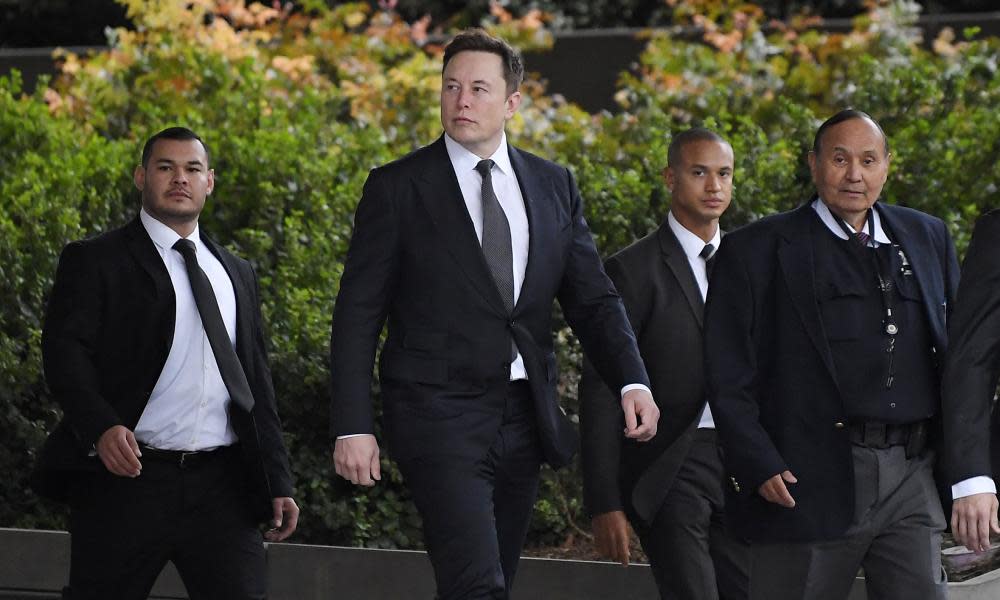Musk, Bloomberg, Bezos: America's aristocracy of tech robber barons lives by its own rules

Before 1948, if a British duke, viscount or baron was accused of a felony, he was tried not alongside the common criminals in the Old Bailey, but by a jury of his peers in the House of Lords.
I thought about that two-tiered system of criminal justice quite a bit last week, when I spent four days in a Los Angeles courtroom covering the civil defamation trial of Elon Musk. The Tesla and SpaceX chief had been sued by Vernon Unsworth, a British cave explorer who assisted with the Tham Luang cave rescue, for calling him a “pedo guy” on Twitter.
Musk’s special status as one of the world’s approximately 2,100 billionaires loomed over the trial, from jury selection, when prospective jurors were asked to reveal whether they had any strong opinions about billionaires, to closing arguments, when Unsworth’s attorney argued that $190m in damages would constitute a “hard slap on the wrist”.
The US has never had an aristocracy, but our abandonment of progressive tax policy and antitrust enforcement has in effect created a pseudo-peerage populated by a new class of techno-robber barons. These billionaires may be flesh and blood, but they’re not operating under the same set of rules as the rest of us.
These billionaires may be flesh and blood, but they’re not operating under the same set of rules as the rest of us
Nearly as many Americans pay a tax to Jeff Bezos in the form of Amazon Prime membership each year as pay federal income taxes. Tom Steyer, a billionaire for whom no American has ever cast a vote (and for whom, I’d wager, no American ever will), bought his way on to multiple Democratic presidential primary debate stages. Michael Bloomberg, the former Republican mayor of New York City, has spent more on television ads in five weeks of campaigning than the rest of the non-billionaire Democratic candidates combined have all year.
Musk’s attorneys argued (successfully, it turned out) that his smear of Unsworth was nothing more than an insult, and that a court of law was the wrong venue to sort out an argument “between two men”. But as much as Unsworth and Musk may be equals before the law, the trial showed just how untenable this fiction of equality between billionaires and mere mortals is.
The selection of Musk’s jury felt positively feudal at times, as prospective juror after prospective juror raised a hand to disclose business ties to one or more of the billionaire’s companies. Musk’s attorneys framed Unsworth’s mockery of a global celebrity in a CNN interview as equivalent to Musk’s tweets, and the guy with an income of £25,000 as the schoolyard bully picking on the friendly neighborhood engineer. And yet, Musk was fully aware of the fact that, as he testified, “If I write something on Twitter, it will get reported.” He could have and should have known that his “pedo guy” smear would forever link the name of a private figure (and good samaritan) with pedophilia.
Related: Tech giants watch our every move online. Does that violate our human rights?
One of the most unnerving moments for me was the testimony of Jared Birchall, the manager of Musk’s family office, whose utter ineptitude when it came to hiring a private investigator to dig up dirt on Unsworth would be comical if it weren’t so disgusting. A former private wealth manager for Merrill Lynch, Birchall testified under oath that his boss had never implied that Unsworth was a pedophile; it was “the media” that smeared Unsworth by jumping from “pedo” to “pedophile”, he said.
Just as light bends around a black hole, so does reality appear to warp when it comes into proximity with a billionaire. Is it any wonder that Musk believes in his own moral rectitude, when everyone around him is apparently paid to agree?
At the end of the trial, as Musk grinned and walked away scot-free, I was left with the impression of a kind of an outsize Tom Buchanan from the Great Gatsby – powerful, careless, and cruel. (Video that emerged of him crashing his Cybertruck over a traffic cone the next day did little to dispel this image.)
Perhaps we need to return to a two-tier system of justice, one that holds billionaires to a higher standard of behavior in recognition of their disproportionate influence and capacity for harm. Or perhaps we should abolish our modern-day aristocrats altogether, not, as the French did, with guillotine and pitchfork, but through taxation and confiscation.
What I’m reading …
Ring’s hidden data let us map Amazon’s sprawling home surveillance network, by Gizmodo’s Dell Cameron and Dhruv Mehrotra
Amazon’s internal injury records expose the true toll of its relentless drive for speed, by Reveal’s Will Evans
She was Instacart’s biggest cheerleader. Now she’s leading a worker revolt, by the Washington Post’s Nitasha Tiku
How a Facebook employee helped Trump win – but switched sides for 2020, by the Wall Street Journal’s Deepa Seetharaman
Silicon Valley is listening to your most intimate moments, by Bloomberg’s Austin Carr, Matt Day, Sarah Frier and Mark Gurman

